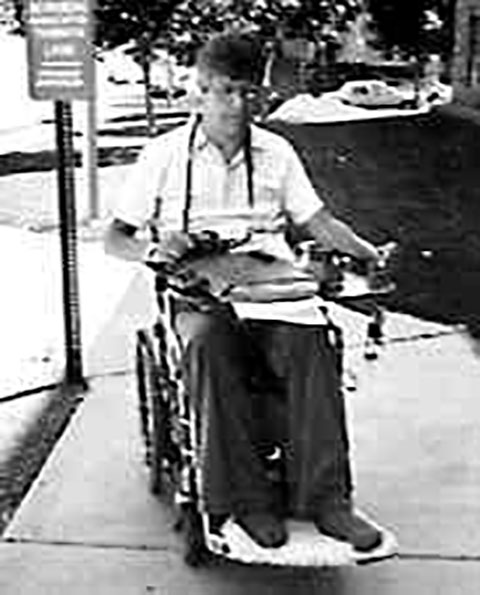Dana Watten: Challenge Rather than Accept the Status Quo
as Recorded by Mary O'Hara Anderson
Dana Watten was born in August of 1936. On July 15, 1954 at the age of 17, Dana had a diving accident that left him a quadriplegic. At that time Dana lived with his mother and stepfather. He also had an older brother who no longer lived at home.
Dana's mother Marie worked outside the home for two years after the accident. Dana still has stretchmarks under his arm from the position he had to be in all day while his mom was at work.
He could not have the head of the crank style bed up while he was alone because if he had a spasm, he would fall out of bed. When his mom came home from work, Dana would get up in his manual wheelchair, and people would push him around the neighborhood.
Manual wheelchairs and crank hospital beds were all that existed then. When technology advanced, Dana was one of the first to get an electric hospital bed. However, the controls were located at the side of the bed, so he could not control the bed himself.
Eight years after his accident, power wheelchairs became available. When Dana got his first power wheelchair, he felt as if he had a pair of wings. He now had some independence. The cost of Dana's first power wheelchair was $900. When he purchased a new chair in 1995, the cost had increased to $6,000.
In 1976, Dana moved into a nursing home and was there for about a year. While he was in the nursing home, his mother Marie remained a constant support. Dana attributes his ability to survive during these more than twenty years to Marie and his stepfather Al.

Dana Watten outside of Seward Square
Dana and I met at Sister Kenney Institute in 1976. There was a new apartment building that was 100 percent accessible. I arranged for transportation with a friend Michael Patrick, and we took Dana and Marie on a tour of what was available. The apartment would have been perfect, but there was no Personal Care Attendant program then.
Dana met with Leah Labarre Welch, who herself was going through much of what Dana was, and she told Dana about the homemakers program. At that time the homemakers program was for sick moms with little children, but somehow Leah had managed to change that and had received homemaker hours for herself. Dana applied, and after many letters to Senators and Congressmen, was accepted in the program. Soon after that, Dana left the nursing home for his new home. In 1979, the Personal Care Attendant program (PCA) began in Minnesota, and Dana remains on that program today.
In 1980, I was working for Realty Management (now Lasalle Management, Inc.). I was being transferred, and Dana and I had conversations about the job I was leaving.
I was managing a new apartment for people with disabilities called Seward Square. I encouraged Dana to apply for the position. A few days before his interview he landed in Sr. Kenny Institute with a kidney stone. The property manager was not overly impressed with any of the other applicants, so I suggested that she go over to the hospital and interview Dana. She did, and Dana got the position.
In July of 1980, Dana became resident manager of Seward Square Apartments, and in 1983 when I left Lewis Park Apartments, Dana became their manager, too. To this day he is managing both buildings. He has been gainfully employed for sixteen years! But there's more.
Dana has a new bed with a control box that he can use. This technology has cut down the PCA service hours Dana once required. Dana requires a PCA 11 hours a day now instead of 24 hours. Dana has a spend down of $538.00 a month so the PCA program pays approximately $1,800.00 a month to his attendant. This is the only subsidy Dana receives.
A year after Dana became gainfully employed, he dreamed of buying a van and learning to drive. He took lessons at Sister Kenny and got the down payment together for the van. Marie went with him to pick up the van. On his way home, as he drove around a curb, the device to secure him, having been improperly installed, came loose. He fell and lost control of the vehicle. The van was demolished, and Marie was injured. Six months later, after many hassles with the insurance company, the van was replaced, and he and Marie had a much better trip home.
In 1985, Dana met Rozanne. They made many trips together around the state. They also frequently went to Byerly's where Dana's mother Marie, who was over 80 years old, worked as a hostess.
Dana feels that he missed more than twenty years of weekends, so now he wants to enjoy every weekend. Since the passage of the Americans with Disabilities (ADA), there are many more opportunities for access to lakes, recreational and vacation areas; and Dana and Rozanne try to take advantage of all of them.
I asked Dana what currently bothers him the most regarding independent living. He said the apathy he sees in so many of the people who live in the buildings he manages and the alcohol and (prescription) drug abuse. He feels very strongly that all the gains made for people with disabilities will be lost because the next generation seems to "accept" rather than challenge.
Family support, especially from his mother Marie, helped Dana survive. Now technology has put him on equal ground with people without disabilities. He has a home, job, friends, and is part of the community in which he lives, and oh yes, he pays taxes!
Postscript:
Dana Watten died December 17, 1996 at the age of 59.
